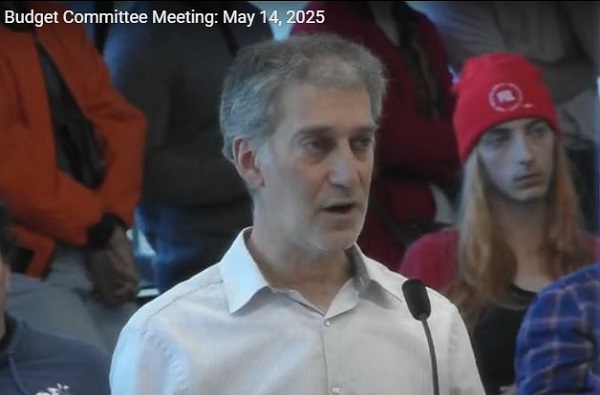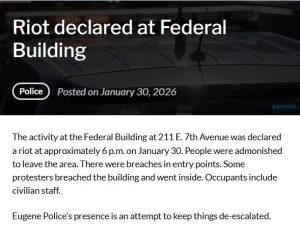Partnerships with Greenhill, nonprofits ‘great investment of a public dollar’
7 min read
Presenter: Public comments at the Budget Committee May 14 urged the city to fully fund its contract with Greenhill Humane Society. Kelly Clayton:
Kelly Clayton: My name is Kelly Clayton of Eugene and I’m here tonight as a voice for those who cannot speak for themselves, our animals. I urge you to reject the proposed elimination of animal services and the sheltering contract with the Greenhill Humane Society.
[00:00:22] This proposal is not just a budget cut, it is a moral failure in the making. And it’s a reversal of over a decade of compassionate community-centered progress. If this program is cut, Eugene Police will no longer have the ability to impound animals in emergency situations—situations where animals have severely injured someone, bitten someone, are present when their owner is arrested or hospitalized, are causing traffic hazards, or are victims of cruelty and neglect.
[00:00:49] Without this service, dangerous, suffering, and abandoned animals will be left with nowhere to go and no one to intervene. Imagine, no more capacity to investigate animal cruelty or neglect, no response to animals left in hot cars, no patrols for off-leash dogs that threaten children and pets at our parks, no centralized way for a family to report or recover a lost pet, no shelter for animals who are dumped on our streets.
[00:01:17] Last year alone, Greenhill sheltered nearly 1,600 animals. Each of those animals represented either a public safety risk or an animal in crisis. Removing this infrastructure leaves our city vulnerable, both ethically and practically.
[00:01:33] We cannot expect police, emergency responders, or citizens to handle these situations on their own. That is unrealistic and unfair. Make no mistake, this cut will not save money in the long term. It will cost us more in emergency responses, in legal liability, and in the erosion of public trust.
[00:01:54] More importantly, it will cost lives. To defund this program is to turn our backs on the vulnerable. It is to dismantle a safety net that protects us all. And it is to forget that how we treat animals reflects who we are as a society.
[00:02:10] I urge you to preserve funding for Eugene’s animal services and the Greenhill contract. Protect public safety, uphold compassion, and keep Eugene a community that we can be proud of.
[00:02:22] Presenter: Nikole Garcia:
[00:02:24] Nikole Garcia: My name is Nikole and I’m a senior fosterer at Wiggly Tails. I’ve also done rescue for 25+ years across three states. So I have a lot of experience in that area.
[00:02:34] I reviewed the proposals as they were outlined regarding the sheltering contract and the animal control services. And I wanted to say first of all that I’m not sure how we’re actually cutting these, because according to ORS 609, the Section 609, that they require the local municipalities to have these sheltering services that are usually paid for, or it says that they’re supposed to be paid for by licensing and impounding and or the general fund, and in lieu of that they need to contract that out. And that is in our current Oregon state laws.
[00:03:09] And there’s no clause in there for you know skipping these or if they can’t afford them or something bad. It’s in there. There are also the ORS section 609 covers specific duties of the animal control officer, including impounding animals in case of neglect, hoarding, violence, and so on. And without the animal control officer, we have no way of doing that. There’s no other laws that outline how those things were supposed to happen without animal control.
[00:03:37] So without the legal coverage, the animals would suffer for it. The shelter also has no contractual obligation to accept any animals from the city of Eugene, from any officer, any official, any general public whatsoever.
[00:03:49] I know that they’re currently working on legislation to try to fix these things at the state level but we don’t have that right now. And so without that we have to resort to property laws which means that all the strays would have to be held by a finder or a rescue or someone else for 90 days and our rescues cannot absorb that right now.
[00:04:07] We are already struggling with the amount of owner-surrender requests we get in a week and we have to turn away a lot of people and we just cannot absorb that. We work with areas you know I’ve worked with areas in terms of across the country where these services are falling apart and it’s not a good outcome. And so I don’t want to see that for the city of Eugene.
[00:04:25] And I also want to see that we stay above the law because we would be skirting that law if we cut these services.
[00:04:33 Presenter: Cary Lieberman:
[00:04:36] Cary Lieberman: Hi, I’m Cary Lieberman. I’m the executive director of Greenhill Humane Society. I’ve lived in Eugene for over 30 years. Everyone is here talking about animals. So I’m going to go off my script a little.
[00:04:46] Seventy percent of families in this country—and clearly in Eugene—own pets, which is why you’re hearing a lot about animals.
[00:04:54] It is a core function of a community to have animal services, really there’s nowhere in the country that doesn’t see it as a core function.
[00:05:04] And Greenhill has been a contract partner with the city of Eugene since 2012 and through the public-private partnership we’ve combined public funding with donations and volunteers to build a program that protects both animals and public safety.
[00:05:18] That’s why the city entered into the contract in the first place, to save money while improving services. And while there’s always more to do, we’ve largely achieved those goals.
[00:05:28] Eugene’s overall budget for animal services including the officers and the sheltering contract is nearly unchanged from what it was in 2010 when the city was paying Lane County $936,000 annually. Look at what is being considered to be cut—it’s roughly the same.
[00:05:48] Since then, the costs, of course, have risen dramatically, but there’s been no increase to our contract since 2020.
[00:05:55] Greenhill has stepped up, we’ve absorbed inflationary costs, and with nearly 1,600 Eugene animals coming through our doors last year, we responded to a 32% increase from prior-to-COVID numbers.
[00:06:11] But today, the city’s contract covers less than half of the actual costs of these services. We’ve stretched every dollar. We’ve relied on donors, volunteers, and sheer determination, but we’re very close to the breaking point.
[00:06:26] There’s no room to cut the sheltering contract. We don’t think there’s any room to cut the animal services contract for the employees that are doing the animal services work either.
[00:06:39] So if Eugene doesn’t fund this service in the face of rising need and real inflation, it does put the entire program at risk of collapse. And while Greenhill will continue to do everything we can, we simply cannot do the city’s work without the city’s support.
[00:06:56] Presenter: Stefan Strek:
[00:06:57] Stefan Strek: It really hits home that so many people are speaking about the necessity of maintaining funding for Greenhill, and that really stands out.
[00:07:09] My cat passed away just last year, but he would have been a cat that would have gone to Greenhill once upon a time. He was a really great guy that left this cat behind. He grew up in this city and there wasn’t enough services for him so he died of unfortunate causes and nobody wanted this cat. I couldn’t let him go to Greenhill. He meant a lot to a lot of people.
[00:07:44] On that regard, I still have a beautiful little cat that I did adopt from Green hill and she came from a situation where there were 37 cats abandoned in a two bedroom apartment and Greenhill working with the sheriff’s department responded to them being abandoned with no food or water and rescued them which was a very great service for our community to have.
[00:08:12] Anyways, the funding is there seeing as how we have a budget of about a billion dollars and moving around just $10 (million) or $15 million out of $1 billion isn’t that much to ask for.
[00:08:26] Presenter: Kelly Johnson described the many benefits of partnerships with nonprofits:
[00:08:31] Kelly Johnson: Hello, Budget Committee. My name is Kelly Johnson. What a community we have. I’m so inspired by everybody who’s got up here and talked, and, I’m just wowed.
[00:08:40] I just want to give you some food for thought. There’s been a lot of great information that you guys have had here today, and that is about an effective use of a public dollar. There’s cuts happening at every level of government, and so we really have to be smart with our dollars and as somebody that’s worked in the nonprofit sector in Eugene since 2011, I think partnering with nonprofits is such an effective use of a city dollar.
[00:09:07] Something like Greenhill, something like CAHOOTS is a way that you can expand city services. And as a nonprofit leader, our nonprofits have the smartest people, the really good workers, the experts in their field and they know how to make a dollar go really, really far. And so when we think about these partnerships between the city and nonprofits it’s a great investment of a public dollar. Thank you so much.
[00:09:34] Presenter: During public comment at the budget committee May 14, support for Greenhill and other local nonprofits as the best possible investment of a public dollar.
This story produced by John Q for Whole Community News, covering preparedness and public comment on KEPW 97.3, Eugene’s PeaceWorks community radio.




